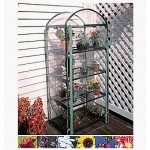Outdoor herb gardens
 Outdoor herb gardens have been the standard method of growing lush and tasty herbs. With a little planning, you can have a lush outdoor herb garden from spring through early fall.
Outdoor herb gardens have been the standard method of growing lush and tasty herbs. With a little planning, you can have a lush outdoor herb garden from spring through early fall.
A big consideration for outdoor herb gardens is location. This includes both the amount of land you would like to devote to the garden, how much sunlight the location receives, and the properties of soil. For cooking convenience, try to plant your herb garden as close to the kitchen as possible. If you don’t have the ground space then you may want to consider container gardening.
Space
Space is a large factor for many gardeners. Many homeowners live in suburbs or more urban locations with limited space to devote to a garden. If this is the case for you, it is essential to carefully plant your herbs with enough space, but not too much. You may need to consider species that require less space so you can get the maximum yield from your garden. Many outdoor herb gardeners solve this issue by utilizing a community garden near where they live. Community gardens offer plenty of space to grow, and will prepare your plot by tilling it in the spring.
Sunlight
The amount of sunlight your garden will receive is another essential factor for planning your outdoor herb garden. Most herb require plenty of sun, at least 6 hours of direct light per day. Make sure you pay attention to the location you are considering for your garden to ensure your plants will receive the correct amount of sun per day.
Soil
The properties of the soil where you are planning your garden should be considered. Most common herbs require well-draining soil for the most production and best tasting leaves. If your soil is not well-draining it can be easily correct using a variety of methods. Checking the drainage of your soil is an easy process. Simply dig a hole 12 inches deep and 6 inches wide. Fill the hole with water and allow it to completely drain. Then, fill it a second time. Observe how long it takes to drain. If it takes more than 8 hours, you have a drainage problem.
Correcting drainage can be done with a few simple methods. For most soils, adding in compost will improve the drainage well enough to be able to plant your herbs. Mix in 1 part compost per 1 part garden soil. For soils that are high in clay, the addition of sand or crushed rock (as well as compost) may be necessary.
If prepared correctly, your outdoor herb garden should not need much more care that watering and weeding. Some gardeners also choose to add occasional organic feeding into their care regimen. It is important to water your garden correctly. Most herbs do not tolerate waterlogged soil. If you receive rain every 4 to 5 days, then a light sprinkle is plenty of water to keep your herbs healthy and vibrant. If you go more that 5 days without rain, you may water more. Make sure to pay attention to forecasts so you do not overwater before a heavy rain.



